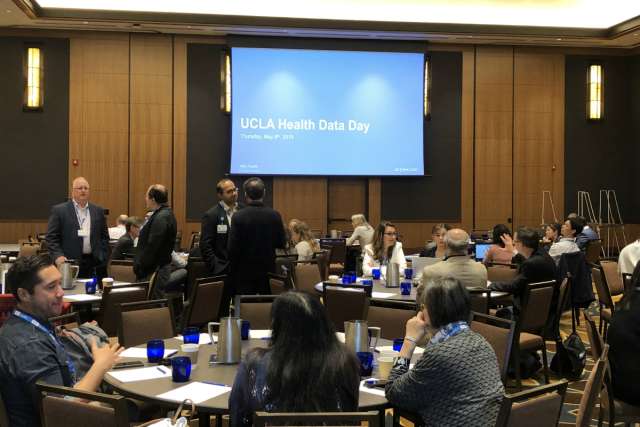How can we use data to better prevent, diagnose and treat disease?
That was one of the central questions addressed at Data Day, an event hosted in May by UCLA Health.
The event, held at the UCLA Luskin Conference Center, showcased the data analytics and computing capabilities available for researchers, analysts and stakeholders across campus to advance medical research and the delivery of care.
Various teams from the David Geffen School of Medicine at UCLA, the Department of Computational Medicine, the Institute for Precision Health, the Clinical and Translational Science Institute, and other areas of the organization presented the results of their collaborations and shared insights into new ways to use data to improve care.
Michael Pfeffer, MD, assistant vice chancellor and chief information officer for UCLA Health Sciences, and Mohammed Mahbouba, MD, chief data officer, announced UCLA Health’s launch of the Discovery Data Repository, a dashboard that provides UCLA analysts and researchers with access to Epic Care Connect data to gain new insights for medical discoveries.
Los Angeles’ diverse population provides a unique opportunity for researchers and clinicians to ensure science involves under-represented communities. Daniel Geschwind, MD, PhD, director of the UCLA Institute for Precision Health, spoke of the recently launched UCLA AtLAs California Health Initiative, which has already collected 30,000 samples on its way to bio-banking and genetically characterizing a diverse sample of 150,000 patients across the health system.
Much of the research into the genetics of autism and other brain disorders has been conducted in populations of European origin. Researchers want to know more about how Asian, African-American and Latino populations may have unique genetic profiles, and the UCLA AtLAs initiative aims to address such gaps in research.
Steven Dubinett, MD, director of the UCLA Clinical and Translational Science Institute, spoke of the institute’s mission to move innovative treatments developed in labs into the clinic. The ability to work with complex data, he says, is vital to this mission.
"We now know how to deal with large datasets relevant to health care," said Dr. Dubinett. "Physicians make decisions based on five or six data points, but now our goal is to help them make decisions based on thousands of points that change in a temporal manner. We have the infrastructure and workforce to accomplish this. With these resources, UCLA will contribute to the greatest transformation in modern healthcare."
In order to grapple with large and complex data sets, experts are using powerful new technologies. The Department of Computational Medicine -- a joint effort between the David Geffen School of Medicine and the Samueli School of Engineering, and chaired by Eleazar Eskin, PhD -- aims to transform patient care by using such technologies, including artificial intelligence and machine learning. Various teams will have access to these technologies through UCLA Health's adoption of Microsoft Azure.
Alex Bui, PhD, director of the UCLA Medical and Imaging Informatics Group and co-director of the UCLA Center for SMART Health, discussed the promise of machine learning through his team’s work to assess health risks and improve care delivery for patients. UCLA teams are using the technology to detect early lung cancers and to determine, for example, whether it’s possible to predict when a child is going to have an asthma attack in order to intervene early.
Predictive technologies are a focus for several teams at UCLA. Eric Cheng, MD, chief medical informatics officer, and Joycee Berin, director of enterprise analytics, spoke of the data science ecosystem enabling their team to implement a tool called the Modified Early Warning System, which identifies patients whose health is likely to deteriorate.
Recurring throughout the day was the theme of collaboration, with the goal to join forces to make data useful for patients.
"The promise of technology in the health care field is not just about our ability to draw these incredible insights and develop these powerful algorithms for our data," said Dr. Pfeffer. "It's about our ability to take that information and get it back to our providers and to our patients in real-time, so they can make informed decisions."



